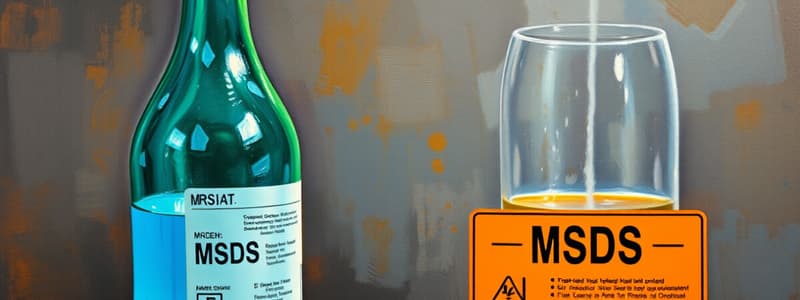Podcast
Questions and Answers
What does MSDS stand for?
What does MSDS stand for?
- Material Safe Disposal System
- Material Safe Data Sheet
- Material Safety Data Standard
- Material Safety Data Sheet (correct)
How many sections does a MSDS have?
How many sections does a MSDS have?
16
What is contained in Section 1 of a MSDS?
What is contained in Section 1 of a MSDS?
Identification of the chemical and recommended uses.
What does Section 2 of a MSDS address?
What does Section 2 of a MSDS address?
What information is provided in Section 3 of a MSDS?
What information is provided in Section 3 of a MSDS?
What does Section 4 of a MSDS cover?
What does Section 4 of a MSDS cover?
What does Section 5 of a MSDS provide?
What does Section 5 of a MSDS provide?
What is addressed in Section 6 of a MSDS?
What is addressed in Section 6 of a MSDS?
What information does Section 7 of a MSDS provide?
What information does Section 7 of a MSDS provide?
What is discussed in Section 8 of a MSDS?
What is discussed in Section 8 of a MSDS?
What properties are described in Section 9 of a MSDS?
What properties are described in Section 9 of a MSDS?
What kind of information can you find in Section 10 of a MSDS?
What kind of information can you find in Section 10 of a MSDS?
What is provided in Section 11 of a MSDS?
What is provided in Section 11 of a MSDS?
What does Section 12 of a MSDS inform about?
What does Section 12 of a MSDS inform about?
What guidance is offered in Section 13 of a MSDS?
What guidance is offered in Section 13 of a MSDS?
What does Section 14 of a MSDS detail?
What does Section 14 of a MSDS detail?
What information can be found in Section 15 of a MSDS?
What information can be found in Section 15 of a MSDS?
What does Section 16 of a MSDS include?
What does Section 16 of a MSDS include?
What is OSHA?
What is OSHA?
Study Notes
Material Safety Data Sheets (MSDS)
- MSDS provides crucial information on the hazards (health, fire, reactivity, environmental) of chemicals and safety guidelines for handling them.
- Comprises 16 sections that systematically present data about the chemical product.
Section 1 - Identification
- Identifies the chemical product and its recommended uses.
Section 2 - Hazards Identification
- Outlines potential hazards associated with the chemical, including flammability and warning details.
Section 3 - Composition
- Details all ingredients, chemical names, common names, synonyms, and trade secret claims regarding substances and mixtures.
Section 4 - First Aid Measures
- Describes initial care for untrained responders in case of chemical exposure.
Section 5 - Fire-Fighting Measures
- Provides strategies for effective fire response related to the chemical.
Section 6 - Accidental Release Measures
- Outlines appropriate responses to spills, leaks, or releases of the chemical.
Section 7 - Handling and Storage
- Offers guidance on safe handling practices and storage conditions for chemicals.
Section 8 - Exposure Controls/Personal Protection
- Indicates exposure limits, necessary engineering controls, and personal protective measures to reduce worker exposure.
Section 9 - Physical and Chemical Properties
- Describes the appearance, physical state, color, odor, vapor pressure, pH, solubility, boiling point, and evaporation rate of the chemical.
Section 10 - Stability and Reactivity
- Discusses the reactivity hazards associated with the chemical and its stability information.
Section 11 - Toxicological Information
- Identifies health effects and toxicological information related to inhalation, ingestion, or contact with skin and eyes.
Section 12 - Ecological Information
- Evaluates the environmental impact of the chemical if released into the environment.
Section 13 - Disposal Considerations
- Provides recommendations for the safe disposal of the chemical and its container, including recycling and reclamation options.
Section 14 - Transport Information
- Offers guidance on classification for shipping and transporting hazardous chemicals.
Section 15 - Regulatory Information
- Covers safety, health, and environmental regulations applicable to the product, not mentioned elsewhere in the MSDS.
Section 16 - Other Information
- Indicates the preparation date of the MSDS and the date of any revisions, alongside relevant references.
Studying That Suits You
Use AI to generate personalized quizzes and flashcards to suit your learning preferences.
Description
Test your knowledge on Material Safety Data Sheets (MSDS) with this set of flashcards. Learn about chemical safety, regulatory agencies, and the structure of MSDS. Perfect for students and professionals working in chemical safety and compliance.




